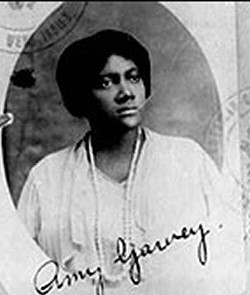 “If ever there was a life of lived Pan Africanism, it was that of Amy Ashwood Garvey” (Adi and Sherwood 69). This quote may be surprising to many since, as stated by pan- Africanist scholar Horace Campbell, the ideological history of Pan Africanism has almost always focused on the contributions made by great heroes, mostly male, which denied the link to a broader social movement and the role of women (Campbell 286). This in itself emphasizes the struggle for a woman’s voice to be heard in movements and by extension the wider society, when dominated by male figures.
“If ever there was a life of lived Pan Africanism, it was that of Amy Ashwood Garvey” (Adi and Sherwood 69). This quote may be surprising to many since, as stated by pan- Africanist scholar Horace Campbell, the ideological history of Pan Africanism has almost always focused on the contributions made by great heroes, mostly male, which denied the link to a broader social movement and the role of women (Campbell 286). This in itself emphasizes the struggle for a woman’s voice to be heard in movements and by extension the wider society, when dominated by male figures.
Amy Ashwood Garvey (1897-1969), the first wife of Marcus Garvey, is acknowledged as building upon the feminist activist work of African and Caribbean feminists before her. She made significant contributions to the Pan Africanist movement, feminism and community development in Britain, the Caribbean and West Africa. Born in Port Antonio, Jamaica in 1897, Amy met her future husband Marcus Garvey at the age of seventeen. They were both passionate about African American activism and were involved in political activities that influenced their thoughts, ideas and strategies for liberating Jamaica. The two founded the Universal Negro Improvement Association (UNIA) in Kingston in 1914 which was intended at first as a self-help and education movement with targeted local goals but soon took on a much wider, and eventually global, political and cultural significance. Their marriage soon ended and “Amy wrote that at least one of her reasons for leaving Marcus Garvey had been her desire to help Afro-American women to find themselves and rise in life” (Adi and Sherwood 70). Although Amy passed in 1969, her legacy is carried on, particularly in the arena of African independence and cultural appreciation, and as a pioneer in ongoing efforts to improve the status of black women globally.
Firstly, Amy had major contributions to the development of feminism and gender studies. In the article ‘Gender Equality, Pan-Africanism and the Diaspora’, Rhoda Reddock assesses the 19th and 20th century feminist tradition in relation to the contemporary or third wave feminism. She highlights the interdependence of equal opportunity while exploring the different values of male and female “work” which retards the development of a society. In this area, the influence of feminist teachings on Amy Garvey is significantly highlighted as she contested for the inclusion of “boys and girls” the UNIA’s objectives rather than the broad, generic term of children. This emphasizes Amy’s desire to liberate women by breaking patriarchal boundaries, as she thrives to give social visibility to women and girls and show the importance of their contributions in society.
Furthermore, Reddock (2014) also discusses Amy’s approach to a “dual sex” hierarchy which gave women the opportunity in a male dominated organization to achieve a position of authority and leadership, thereby improving the lives of women. The attainment of these critical and valuable skills attained in the Garvey movement not only helped women in the movement but in other aspects of their personal and political life. The opportunities granted by Amy allowed for the realization that the ‘personal is the political’ and for change to occur women around the world need to think about their personal experiences, gain personal confidence and a sense of power. One needs to be made aware of the oppression experienced in her personal life to further see the oppression in the political spheres of life, and vice versa. This is captured in Feminist Africa, where Reddock (2013: 73) states, “As the life and work of Amy Garvey demonstrate, involvement in these movements created the consciousness and imagination which allowed women to go beyond the parameters of these movements, to challenge patriarchal constructs as they understood them, both in their personal and their public lives as well as their artistic and literary production”.
Essential Reading:
Reddock, Rhoda 2007. ‘Gender equality, Pan-Africanism and the diaspora,’ International Journal Of African Renaissance Studies – Multi-, Inter- And Transdisciplinarity 2 (2): 255-67
Reddock, Rhoda 2014. ‘The first Mrs Garvey: Pan-Africanism and feminism in the early 20th century British colonial Caribbean,’ Feminist Africa 19: 58-77
Further Reading:
Campbell, Horace. 1994. “Pan Africanism and African Liberation”, in Lemelle, Sydney J. and Kelley, Robin G. eds. Imagining Home: Class, Culture and Nationalism in the African Diaspora. London and New York: Verso.
Hakim, Adi, and Marika Sherwood. 2003. Pan-African History: Political Figures from Africa and the Diaspora since 1787. Routledge.
Pan-African News Wire. 2007. “Political Biography on Amy Ashwood Garvey: Pan-Africanist, Feminist”
Reddock, Rhoda. 2006. Feminist Africa Issue 7: Diaspora Voices. South Africa: African Gender Institute.
Reddock, Rhoda. 2013. Feminist Africa Issue 19: Pan Africanism and Feminism. South Africa: African Gender Institute.
Questions:
What contributions does Amy Garvey make to radical political and social thought?
Discuss the political significance of the U.N.I.A and the Garveyite movement in the 20th century
Highlight the impact of Garveyism and Pan-Africanism on Rastafari thought and discuss in relation to gender power relations.
Submitted by Shalinee Bahadur, UWI Socialist Student Conference